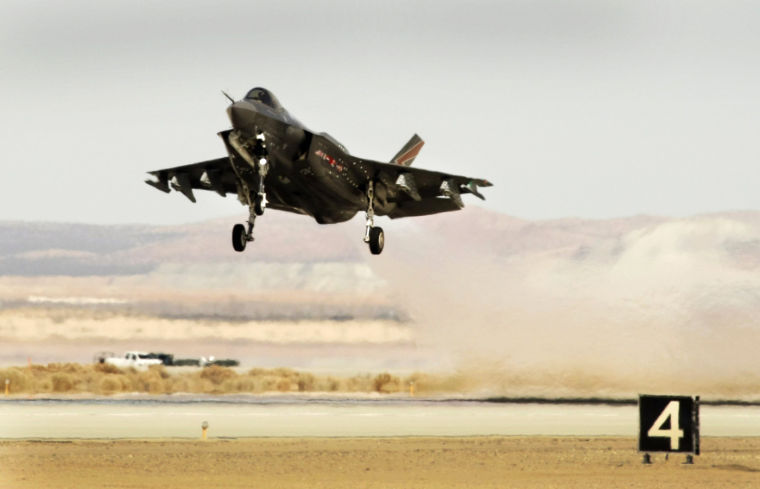NATO, we have a problem
The Lockheed Martin F-35 Lightning II lifts off during testing at Edwards Air Force Base, March 19, 2013.
April 21, 2014
Since the collapse of the Soviet Union in 1991, European nations have been decreasing their defense expenditures on a yearly basis, expecting the American taxpayer to pick up the slack. Now, Russia’s annexation of Georgian territories and the more recent Crimea incursion have proven that to be an unacceptable policy.
This wake of Russian aggression has more than just Americans worried by the prospect of a new Cold War. However, Polish Defense Minister Tomasz Siemoniak has recognized the dangerous position his and other European nations have put themselves in, offering up his perspective, “Events show that what is needed is a re-pivot, and that Europe was safe and secure because America was in Europe,” in an interview with The Washington Post.
Perhaps truer words have never been spoken. The Washington Post has shown these allies of ours are contributing significantly less to defense than they ought to. In fact, since Putin’s capture of South Ossetia and Abkhazia, Georgia has allotted a higher percentage of its GDP to its own defense than any NATO member, besides the United States.
Now is the time to let our European allies know their uncooperative behavior will not go unpunished either by us or by the Russians, evidently.
Indeed, NATO’s own website details the United States’ staggering burden in financing the so-called strategic partnership. The American taxpayer is funding 73 percent of the entire Alliance’s defense expenditures.
To make matters worse, these same European nations are stealing the very technology being developed to defend them. As if their meager contributions to their own safety weren’t already a slap in the face, now they want a five-finger discount.
In the Defense Security Service’s unclassified 2012 report, it’s reported that European and Eurasian attempts at collecting radiation-hardened materials and microelectronics have increased to account for 26 percent of total acquisition attempts, and this estimate is likely downplaying the actual totality of Europe’s hand in this behavior.
Their goal in stealing these technologies is to reduce their dependence on foreign supply and influences for production of military components, and analysts have expressed with moderate confidence that this trend is likely to continue.
You might be wondering what role these technologies play in our defense, and here’s the scoop: the Defense Microelectronic Activity regularly designs and develops these components for use in America’s most advanced weaponry, including the F-35, which also happens to be the costliest defense program in national history.
The official Joint Strike Fighter (JSF) website claims this fifth-generation fighter is intended to be an international development effort by eight nations, but unsurprisingly the U.S. is fronting the large majority of the costs.
The United Kingdom is the largest co-contributor at a measly $2 billion, which covers just 8 percent of development costs alone.
Incredibly, nations that have contributed significantly less, including Denmark, which has only spent $125 million on the program, are upset about the lack of meaningful contracts awarded to their domestic producers to work on the F-35, going so far as threatening to reduce their already laughable participation or buy inferior European fighters.
On top of this pittance of international funding for development of the JSF, coupled of course with European efforts to steal the technologies used in these planes, are the efforts to slash committed orders that would make up for already lackluster support.
The Congressional Research Service released a report in 2012 that spelled out these efforts in detail. Even the U.K., which holds the highest foreign stake in the program, has cut its order from 138 planes to “as few as 40,” according to the report. Italy, which has given only half of what the U.K. gave, has also cut orders from 131 to 90 F-35s.
It’s clear now these friends are behaving more like foes, and its time America reminds them of where their bread is buttered.
If Siemoniak is serious about a re-pivot from Asia back to Europe, his nations and others need to make serious changes of their own. For one, these NATO allies need to sharply increase their defense spending as a portion of their GDP.
Second, those involved in industrial espionage aimed at collecting military tech must reduce or cease these efforts. Finally, those nations that have reneged on their orders of the F-35 JSF must either contribute more to development costs or reinstate their previous purchase commitments.
The American taxpayers cannot continue to fund their own military while allowing deceitful NATO allies to goad it into funding their defense also. Hind sight is 20-20. Let’s hope Europe’s foresight improves to that level in the face of a reemerging Russian threat.
– Bryan Allen is a junior political science major from Puyallup. He can be contacted at 335-2290 or by [email protected]. The opinions expressed in this column are not necessarily those of the staff of The Daily Evergreen or those of Student Publications.



















